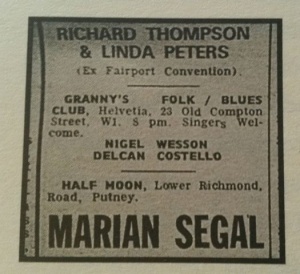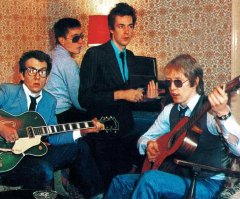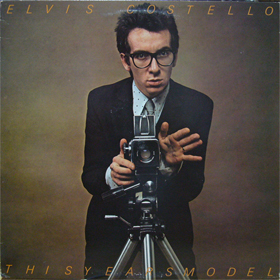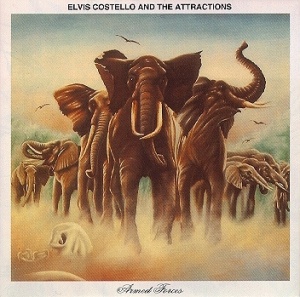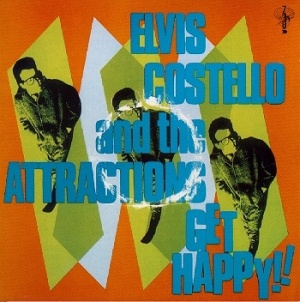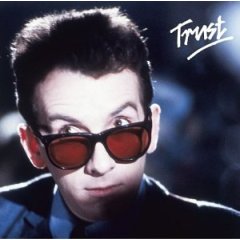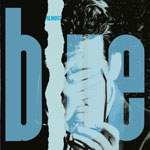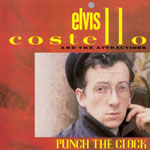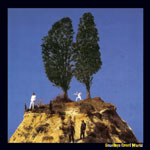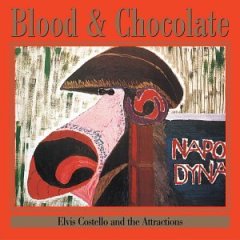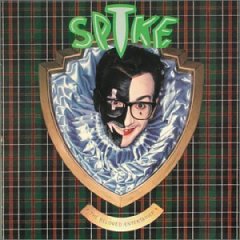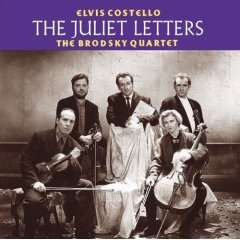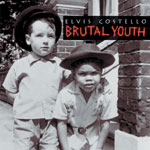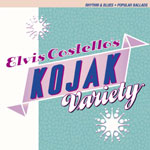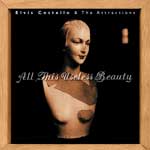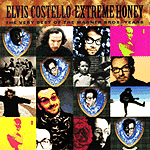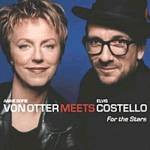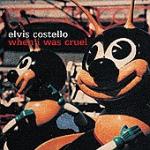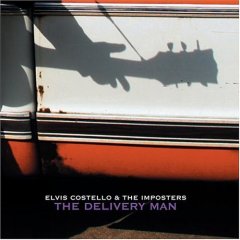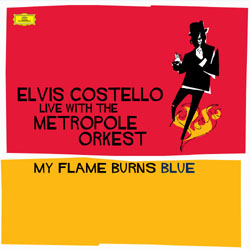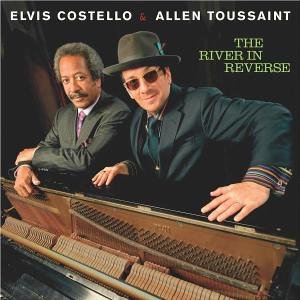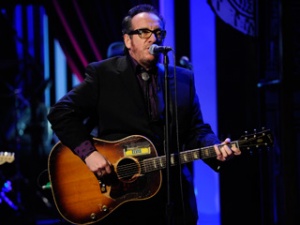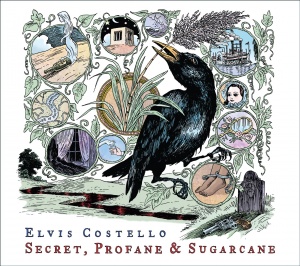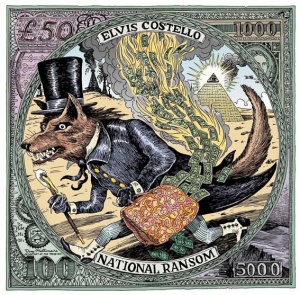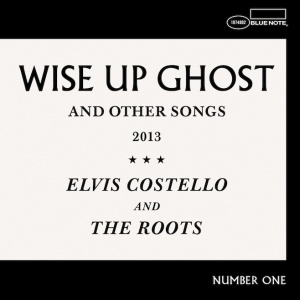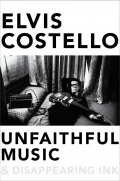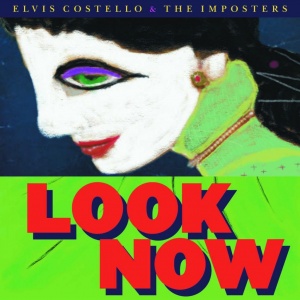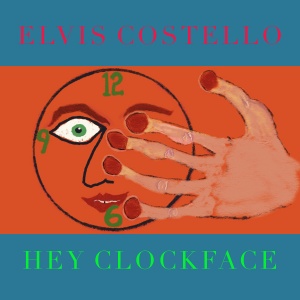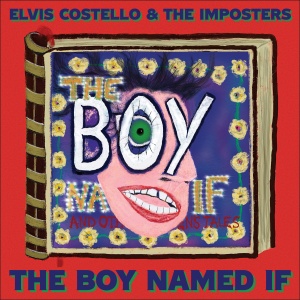Biography
|
The Rise And Rise Of Elvis Costello
This wiki page was originally derived from a biography by the "Pope Of Pop", Paul Inglis, and is edited and maintained by members of this community.
On This Day in 1954...Declan Patrick MacManus began having the time of his life on Wednesday, the 25th of August, 1954. Declan was born at St Mary's Hospital, Paddington in London, England. He was the son and only child of trumpeter, vocalist and erstwhile bandleader Ronald (“Ross”) Patrick McManus (born in Birkenhead, October 20, 1927) and record store manager Lillian Alda Ablett (born in Liverpool, 1927). Note that the family was originally known as "McManus" but Ross later started using "MacManus" as a surname, and that is the spelling on Ross and Lillian's marriage certificate as well as on Declan's birth certificate. The MacManus family’s original association with music occurred quite literally by accident. Elvis' grandfather Patrick was an orphan – his father (Elvis' great-grandfather) John McManus (who was an Irishman from County Tyrone who'd moved to England) was killed in an accident on the dockside in Birkenhead and Patrick's mother (Elizabeth Costello) didn't survive much longer herself. Patrick and his brothers got shipped off to an orphanage in Southall where they all learned to play musical instruments. Patrick later ended up in the British Army in Ireland and was shot in 1917 (I assume he didn't heed the warning he was given by his Irish mates – as retold by Elvis in his song "Any King's Shilling") but later recovered and played jazz on the luxury trans-Atlantic cruise ships "Georgic" and "Majestic" up until 1933. "Nine Year Old Puts His Money Down"Ross, Lillian and Declan first lived in Olympia in Kensington (inner West London), and then moved to Twickenham, Middlesex, on the outskirts of West London, when Declan was five. Declan attended St. Edmunds Roman Catholic Primary school in Whitton and then Archbishop Myers Secondary School (now known as St Mark's Catholic School) in Hounslow. Ross and Lillian separated when Declan seven and then split permanently when he was ten. At the time of Declan’s early childhood Ross was a featured vocalist with the Joe Loss Orchestra (Britain’s premier big band) and he used to bring home acetate recordings to practice the latest pop tunes. Ross also had some success as a pop star: in 1964 he wrote and recorded a ska styled song called “Patsy Girl” (HMV, POP 1279, credited to Ross McManus) which flopped initially on its release in the UK, but later entered the Top 20 in Germany in July 1966. Ross also had a Top 20 single in Australia in 1970 with "The Long and Winding Road" (Spark 14 643 A)[1], under the pseudonym "Day Costello". Ross is also known in the UK as the singing voice of the "Secret Lemonade Drinker", a UK 1973 television commercial now regarded as one of the most iconic of that era.[2][3] Declan accompanied his father on guitar and backing vocal at the recording session for this jingle. Ross and Declan even appear on camera, as members of the secret lemonade drinker's fantasized backing band, on a little-seen version of this commercial. Declan loved to listen to his parents records, his favourite (even as a toddler) being Frank Sinatra’s version of Cole Porter’s “I’ve Got You Under My Skin”. When he was nine, Declan received his first record (The Beatles' "Please Please Me") and within a year or so, Declan bought his first record with his own money, the Georgie Fame EP "Fame At Last". Coming from a musical family (aside from his parents’ professional connections with the music world, MacManus’ grandfather, Patrick, was also a musician, as are Declan’s four half-brothers from Ross's second marriage; Ronan, Liam, Kieran and Ruairi have all been working musicians, Ronan being the most prolific) it was almost inevitable that Declan would pursue a career in music. Rusty, But Improving RapidlyIn 1970, Declan moved with his mother to Liverpool, where he attended an all-boys Catholic school for his last two years of secondary school. Although he worked on the school magazine and was even a prefect (hall monitor), he was not a particularly strong student, ultimately earning one A-level (a university entrance exam) in English. Declan had been playing music in front of an audience, always performing his own songs, since his first public appearance in 1969 at a folk club in Richmond called 'The Hanging Lamp', located in the Crypt of St. Elizabeth's Catholic Church.[4] He had attended The Hanging Lamp regularly, both as a performer and as a spectator. Declan found the folk scene in Liverpool to be less inviting than in London, and certainly less tolerant of young aspiring songwriters.[5] Nevertheless, he managed to perform his songs whenever he could, usually for free at open-mic nights, although by 1971 he had earned a little money occasionally. In January 1972 Declan joined a band called Rusty. Originally a 4-piece founded by another teenage musician named Allan Mayes, it soon became a duo featuring Declan and Allan. Joining Rusty meant Declan was performing in front of an audience regularly for the first time. The band played 88 gigs in 1972 alone, albeit typically to audiences of a few dozen people. On a good night, they might earn as much as £8 or £10, but more typically they were paid much less or even nothing. Allan realized right away that his new bandmate was a gifted and prolific songwriter, able to quickly come up with good songs in a variety of styles. One of these songs was a very early version of a song Declan, by then Elvis Costello, would record as Ghost Train. Allan also observed that Declan already had some of the intensity as a performer that would eventually make him famous. For his part, Declan regarded Allan as a better singer and guitarist than himself, and much more confident in front of a crowd. When Declan finished school in mid-1972, he had neither the ambition nor the qualifications (admittance to college typically required three A-levels; he only had one) to pursue a career in anything but music. After applying for every job he thought he had a chance of getting, he wound up, fatefully but almost by accident, as a computer operator for the Midland Bank data processing centre in the Merseyside town of Bootle. This job involved working with little supervision and, to a large extent, simply waiting for the mainframe computers to complete their task before beginning them on the next one. This left Declan plenty of time, while on the clock, to write songs. He would continue in this line of work, for the most part, right up until he turned professional as Elvis Costello five years later. In November 1972, Rusty made a lo-fi home demo of six of their songs, four of Declan's and two of Allan's. By early 1973, Declan had realized that the music scene in Liverpool was too small to support his ambition to become a professional songwriter and musician. He would have to move back to London to have a real chance at making it. Back in London They'll Take You to Heart After a Little WhileIn February or March of 1973, Declan moved back not only to London but to the same Twickenham flat he grew up in. Declan’s father Ross was now living in that flat with his second wife, Sara, and had invited Declan to stay with them. Declan had arranged transfer from the Midland Bank's Merseyside data centre to a branch office in Putney in South West London, where he worked for a while as a clerk. But before the year was done, he would be back to working as a computer operator in a data centre, this time for the Elizabeth Arden factory in Wales Farm Road, Acton. As soon as he got to London, Declan began booking himself into folk clubs, coffee houses, and anywhere else he could perform his songs as a solo act, for free or for a little money. At least some of the time, he booked himself under the name "Declan Costello", his first use of the surname Costello -- that being the maiden name of his paternal great-grandmother, Elizabeth Costello, and a name Ross had sometimes used professionally. The fact that "Declan" was misspelled in print as "Delcan" at least once may have encouraged him to think about using a different given name as well. Declan found more success in his personal life. Shortly after returning to London, he began dating Mary Burgoyne, a girl he'd been smitten with since she began attending his school in Hounslow almost four years earlier. Now Mary was completing her final year at that school. By the time she was in her first term at college later that year, the couple were engaged to be married. Flipped Out in the CityIn the second half of 1973, Declan became friendly with a couple of aspiring musicians and fellow Brinsley Schwarz fans, Mitch Kent and Malcolm Dennis, whom he had run into at several Brinsley Schwarz gigs. They who shared many of his musical interests of the time, which included such artists as The Band, Little Feat, The Byrds, Gram Parsons, Bob Dylan, The Beach Boys, Randy Newman, Neil Young, The Grateful Dead, and Joni Mitchell. By the start of 1974, the band rented a house in Stag Lane, Roehampton, which served as a rehearsal hall and shared living space. Declan moved out of Ross and Sara's flat and into the house with his bandmates and, by some accounts, Mary, his fiancee. After flirting with unpromising names such as "The Mothertruckers" and “The Bizario Brothers”, it was eventually decided to name the outfit "Flip City". The name was suggested by Mary and derived from a spoken section of the song "Twisted" on Joni Mitchell's "Court and Spark" album. (Cheech Marin is heard on the track saying, “Man, the chick is twisted, crazy, poop-shoobie, y'hear? Flip city!") The band was transparently modeled on the Brinsley Schwarz template. (Declan had been a big fan since his Rusty days and had even met Nick Lowe, the bass player from Brinsley Schwarz, in the Liverpool pub "The Grapes"[6] before leaving Liverpool.) Flip City experienced little in the way of success (not surprising as their idols Brinsley Schwarz also failed to achieve anything more than a cult following themselves), occasionally supporting some of the more well known "pub rock" acts of the era, such as Dr. Feelgood, as well as achieving a couple of residencies; a brief one at The Kensington Tavern, and another at the Red Cow. Toward the end of 1975, the band was folded by mutual agreement and Declan went back to playing solo gigs, this time billed as "DP Costello". He Can't Turn It OffIn November 1974, Declan and Mary got married. Sometime before, they had set up housekeeping the flat directly below Ross and Sara's in Twickenham. Early the following year, their only child, Matthew MacManus, was born. Although Declan would often say later that his job as a computer operator was comparatively well paid for the undemanding work he considered it to be, he was earning well below the average wage and struggling to support his family. Unable to afford the rent on their small, two-bedroom flat in Twickenham on their own, Declan and Mary took on two and three additional flatmates at a time, including some colorful and even seedy characters. Eventually, they could not afford the flat at all and young MacManus family moved in with Mary's parents near Heathrow Airport, which meant Declan's commute to work took him past the then-disused Hoover Building on the Western Avenue (A40). After a run-in or two with unscrupulous landlords, they ultimately settled into a rent-subsidized flat in a small block set aside for low-income families in otherwise more affluent Whitton, not far from where Declan had gone to primary school. These experiences would find their way into Declan's lyrics for years to come. Throughout these financial privations, Declan does not seem to have ever considered seeking a better-paid day job or even pursuing promotion at the Elizabeth Arden data center. Instead, he focussed his energies on finding a way to make a living from music. Declan recorded some home demo tapes, featuring vocal and acoustic guitar, of some of his songs and sent tapes of these songs to various record companies during 1976. At one point, Declan even visited the record companies personally and played his songs live in their offices in an attempt to attract attention. Declan was eventually offered a very unsatisfactory deal with Island Records, which he wisely rejected. Declan also forwarded his tape to Charlie Gillett [7], who featured recordings of up and coming artists on his radio show (he also featured other struggling artists such as Dire Straits and Graham Parker). Gillett thought highly of Declan’s songs and contemplated producing a “DP Costello” album himself, if he could obtain some funding. Songs from that demo tape were included as bonus tracks on the Rhino 2CD version of the album “My Aim Is True”. Elvis Is In The BuildingIn August 1976, new independent label Stiff Records placed an ad in the English music press asking for demo tapes. Declan promptly dropped off his tape at the Stiff office, and as soon as Nick Lowe heard the tape, Declan was as good as signed. Stiff Records was the brainchild of Dave Robinson (manager of Graham Parker and the Rumour) and Jake Riviera (born Andrew Jakeman, February 1948, in Edgware, Middlesex), and had already signed up Ian Dury and The Blockheads as well as Nick Lowe (born in Walton-On-Thames, 24 March 1949) who was on board as an artist, producer and all-round svengali. Jake Riviera agreed to manage Declan, and decided to merge Declan's stage name "DP Costello" with that of rock'n'roll's original icon "Elvis Presley". And so, a star was born. Later MacManus was to officially change his name to "Elvis Costello" to complete the transformation. In October 1976, Elvis spent some time recording new solo demos at Pathway Studios. Riviera deduced a certain "American" influence in his new charge's songs and decided to pair Elvis with his latest signing, Californian band "Clover" (now better known to the world as "Huey Lewis and the News", but originally known as "The Tiny Hearing Aid Company") who at the time included pedal steel guitarist John McFee (later of the Doobie Brothers) in their number (Huey Lewis skipped the "My Aim Is True" sessions as his vocal and harmonica talents were not required). The result, recorded in 24 hours of studio time at London's Pathway Studios during December 1976 and January 1977, and produced by Nick Lowe, became Elvis Costello's first album "My Aim Is True". However, before the album was released, Stiff issued a single "Less Than Zero/Radio Sweetheart" in March 1977. The single stiffed, and for a while there seemed to be some doubt as to whether there would ever be an Elvis Costello album at all. Two further singles were released: "Alison" and "(The Angels Wanna Wear My) Red Shoes". The latter in particular generated some rave reviews but little in the way of actual sales. Uncertain of his status as a professional musician, Elvis only quit his job as computer operator at the "vanity factory" when Jake Riviera and Dave Robinson agreed to match Elvis’ relatively meagre wages. Attractively Yours"Elvis Costello" performed his first publicised live gig supporting The Rumour (sans Graham Parker) at London's Nashville Rooms, in West Kensington, on May 27, 1977 (although there are indications that he had also supported The Rumour earlier that May) . Reaction to the performance was very positive, and encouraged by this Stiff placed an ad in the June 4 edition of Melody Maker[8] calling for musicians to form a "rocking combo" to back Elvis Costello. Pete Thomas (born in Sheffield, 9 August 1954, ex-Chilli Willi and the Red Hot Peppers) had already been pencilled in as drummer, and a keyboard player named Steve Nason (born 19 February 1958, later renamed "Steve Naive" and then "Steve Nieve") who was attending the Royal Academy of Music distinguished himself at the auditions not only by being the best player, but also by falling asleep while the other keyboard players vainly attempted to impress Costello, Lowe and Riviera. Bruce Thomas, (born in Stockton-on-Tees, 14 August 1948, ex-Sutherland Brothers and Quiver) was keen to join up but was initially rebuffed after phoning Stiff Records and announcing his influences as "Graham Parker" and "Steely Dan". Undeterred, Bruce quickly learned the bass parts to the Costello records that had already been released and arrived better prepared than the other contenders. It soon became apparent that Bruce's intensely melodic style would provide a very interesting contrast to Pete's all-out drum attack, and might even distract listeners from noticing that Elvis couldn't convincingly improvise lead guitar parts, even though he was a more than adequate rhythm guitarist. The newly formed Elvis Costello and the Attractions played their first gigs shortly before the release of "My Aim Is True" in July 1977. The album garnered rave reviews from the UK rock press and soon entered the UK Top 20 chart. Shortly afterwards a non-album track recorded after the "My Aim Is True" sessions, "Watching the Detectives", became Elvis' first hit single in the UK, reaching #15. The track (again produced by Nick Lowe) featured musical backing by Andrew Bodnar (bass) and Steve Goulding (drums) from The Rumour (Andrew and Steve had also assisted at the Attractions’ auditions) with organ overdubs added later by Steve Nieve. Also in July Riviera persuaded Costello, as a publicity stunt, to busk outside a hotel on Park Lane in London during a visit by CBS US executives. Costello was arrested for obstruction,[9] but the stunt paid off and Costello was signed to CBS' Columbia Records in the US within days. Radar LoveRiviera, Lowe and Costello left Stiff Records in October 1977 and formed a new label, Radar Records, with Andrew Lauder, former A&R director of Liberty/United Artists Records. Radar was distributed by WEA, who were bankrolling the new label in return for exclusive distribution rights in the UK and most other territories. Work was quickly begun on a second album "This Year's Model", with Costello and the Attractions heading for the airport to commence their first US tour while the studio still echoed with the last chord of "Pump It Up". A fortuitous cancellation by the Sex Pistols gave Elvis the opportunity to appear on "Saturday Night Live" in December 1977. Elvis decided to interpret the lyric of his new song "Radio Radio" (recently debuted on tour) a little too literally and "bit the hand that fed him" by cutting the Attractions off during the first few bars of "Less Than Zero" and announcing to the audience that the song was "not relevant" and that they were going to perform "Radio, Radio" instead. Elvis was subsequently banned from performing on the show again, and was not invited back until 1989. However, the incident won Costello the notoriety that Riviera undoubtedly craved. Subsequently a policy of not giving interviews was adopted (the only interview Costello gave in 1978 was with the UK's New Musical Express), and more than one incident of reporters being roughed up by Riviera and his minders was alleged to have occurred. Elvis and the Attractions returned to Eden Studios in London to apply the finishing touches to "This Year's Model" (including guitar overdubs by Mick Jones of The Clash, most of which were not used in the final mix) while "My Aim Is True" finally entered the US Top 40. "This Year's Model" (earlier working titles included "Little Hitler", "Girls! Girls! Girls!" and "The King of Belgium") was released in March 1978 in the UK and the US and amply confirmed Costello's reputation as the most talented and articulate of the "New Wave" of performers. The album went on to reach the UK Top 5 and spawned two UK hit singles, "(I Don't Want To Go To) Chelsea" (#16) and "Pump It Up" (#24). The album also entered the Top 30 in the US. Elvis and the Attractions toured the United States and Canada during the spring/summer of 1978, sharing some bills with Rockpile. One of the shows, at the El Mocambo club in Toronto, Canada, was recorded for radio broadcast and later released as a promotional album that quickly found its way onto bootleg vinyl. This live recording was officially released on CD by Rykodisc as part of the "2 ½ Years" box set in 1994 and was the only officially released Elvis Costello live album prior to "My Flame Burns Blue" (2006) and the mini album "Deep Dead Blue" (1995). These professional triumphs came at a high personal cost. The stresses and temptations of success took their toll on Costello's marriage almost immediately and he found himself following in his father's footsteps in ways he had hoped to avoid. Sometime in the first few months of 1978, Costello and his wife separated. The couple would reconcile the following year. In the interim, Costello carried on a well-publicised, although somewhat intermittent, affair with model and noted rock-star companion, Bebe Buell (born Beverle Lorence Buell in Portsmouth, Virginia, 14 July 1953), whom he met in Los Angeles in June 1978. Emotional FascistIn August 1978, Costello and the Attractions returned to Eden Studios to record Costello's third album, provisionally titled "Emotional Fascism" and then headed off to the Far East and Australia for yet another tour, notable for a particularly memorable concert in Sydney[[10]]. Meanwhile, a new single was released in the UK: "Radio Radio", a left over from the "This Years Model" sessions that was included only on the US version of that album. The single, which stalled just short of the UK Top 20, was backed by a new song: "Tiny Steps" from the sessions just completed at Eden Studios but ruled out of consideration for inclusion on the forthcoming album (presumably because it sounded like it belonged on "This Years Model"). The third album, now retitled "Armed Forces" was released in January 1979 and became Costello's first, and only, Top 10 album in the US. The album also spawned a #2 hit single in the UK, "Olivers Army" (Costello's highest charting single at the time of writing), as well as a second Top 30 UK hit single, "Accidents Will Happen". The album itself also reached #2 in the UK charts. "Armed Forces" also was popular in other territories, reaching #9 in Australia and #8 in Canada, and resulting in a Top 30 Australian single - "Olivers Army" [[11]] and significant airplay in Australia for "Senior Service", which charted in the Top 10 in some Australian radio station's charts purely from airplay. After adding "What's So Funny ('Bout Peace Love and Understanding)" to the US version of "Armed Forces", Columbia Records decided to release "Accidents Will Happen" as a single in the US instead. It subsequently stalled at #101. Despite the impressive sales for "Olivers Army" in other markets, Columbia were wary of releasing that song as a single in the US due to the phrase "white n*gger" in the second verse. Costello allegedly refused to allow an edited version of the song to be released by Columbia. Incidents Will HappenCostello and the Attractions toured the UK and Europe early in 1979 and then returned to the US for a third time to undertake their most ambitious tour yet. However, the pressures of life on the road, in addition to the turmoil of Costello's personal relationships, large amounts of alcohol, plus the hostility of Costello and his manager Jake Riviera to the press, all contributed to an unfortunate incident in Columbus, Ohio in March 1979. A drunken slanging match in a Holiday Inn bar between Costello (and the Attractions) and members of Steven Stills' entourage (including Bonnie Bramlett) led to both sides making ill-considered remarks about British and American musicians. However, only Costello's derogatory comments about certain African-American musicians were reported to the press. The subsequent press furore was reminiscent of the outrage generated in the US by the out-of-context rehashing of John Lennon's "We're more popular than Jesus" remark in 1966. Despite his performances at "Rock Against Racism" shows in the UK, and his anti-fascism songs "Less Than Zero" and "Night Rally", Costello was forced to hastily convene a US press conference and apologise for his statements. Ray Charles, who bore the brunt of Costello's reported remarks, certainly held Costello no ill will, and commented that "drunken talk isn't meant to be printed in the paper." [[12]] The tour was quickly wrapped up, despite "Armed Forces" riding high in the charts, and Costello did not return to the US again until 1981, effectively diminishing any commercial momentum he had generated. It is likely that Columbia’s ultimate decision not to release either "What's So Funny ('Bout Peace Love and Understanding)" or "Oliver's Army" as singles in the US may well have been made in the wake of the "Columbus Incident". Columbia certainly made no further attempt to promote "Armed Forces" despite its Top Ten chart placing, a decision that may have contributed to the album falling out of the Top Ten as quickly as it had arrived there. It is rumoured that Columbia executives even considered cancelling Costello’s contract at this time. For once, Columbia may have been grateful for Costello’s and Riviera’s "No Interview" policy, as the lack of Costello’s face on the cover of any major magazines probably helped the controversy to blow over more quickly. Subsequent events would demonstrate that Elvis Costello was certainly no racist, beginning with Costello’s work as the producer of The Specials, a multi-racial band, during 1979. Their self-titled album went on to top the charts in the UK. Twenty Reasons to Get HappyCostello reunited with his wife and son, did some low-key touring of the UK and Europe, and then returned to Eden Studios in London with the Attractions and producer Nick Lowe in September 1979 to record a fourth album, "Get Happy!!". After recording 10 songs, it became evident that the arrangements (a continuation of the style pioneered on "This Years Model" and polished on "Armed Forces") were not working, at least not to Costello's satisfaction, except for a slow version of "High Fidelity" modelled on David Bowie's "Station to Station". "We thought we were David Bowie doing Station to Station when I wrote it, but I couldn't carry that off with the Attractions because we didn't have [guitarist] Carlos Alomar..." [13] Costello decided to remodel all the arrangements for the album based on various 1960's R'n'B stylings, no doubt hoping that this would confirm his love of "black" American musicians in the wake of the "Columbus" incident. This inspiration led Costello to quickly pen several new songs whilst he, the Attractions and Nick Lowe relocated to studios in Holland where they rerecorded the 10 songs previously attempted and added 10 more. The result was twenty songs somehow jammed onto one mighty crowded album. Due to the failure of Radar Records to achieve success with any artists other than Nick Lowe and Costello, Warner Bros. decided to exercise their option and they withdrew funding for the label. Riviera believed that this made Costello and Lowe free agents, but Warner Bros. had other ideas and the release of the "Get Happy!!" album was tied up by legal injunctions for several weeks. Eventually a new company called F-Beat Records was formed with "Riviera Global Productions" maintaining creative control and Warner Bros receiving exclusive distribution rights outside of the USA until 1983. The album, finally released in March 1980 sold well but failed to improve on "Armed Forces" chart placings (Get Happy reached #4 in the UK and #11 in the US). Costello's UK distributors, anticipating that the album would outsell "Armed Forces", were left with at least 50,000 copies of "Get Happy" literally collecting dust in a warehouse. The album produced one Top 10 single in the UK ("I Can’t Stand Up For Falling Down"), and two other minor hits ("High Fidelity" and "New Amsterdam"), but Costello's previous seeming infallibility now looked shaky and the US Top 100 singles chart once again proved impenetrable, although Dave Edmunds and Linda Ronstadt had both already had major chart successes with versions of "Girls Talk" and "Alison" respectively. Costello and the Attractions made an appearance at Paul McCartney’s "Concert for the People of Kampuchea" in December 1979 in London. Before Costello and the Attractions could reconvene in 1980 to tour the UK and Europe to promote "Get Happy!!", Attractions keyboardist Steve Nieve was injured in a serious car accident in the US which left one of the other passengers dead. Rather than replacing Steve with another keyboardist (for example, Bob Andrews from "The Rumour") Costello decided to opt for a twin guitar attack, drafting in rhythm guitarist Martin Belmont from "The Rumour", resulting in a thicker, heavier on-stage sound than hithertofore. Although no reasons have ever been offered for this experimental change to the Attractions line-up, Costello has commented since that on certain songs during this period he was attempting to emulate the sound that David Bowie achieved with his band in the mid to late 70s (eg, the original arrangement of "High Fidelity") so that is a possible explanation. In the (Northern) summer of 1980, a rejuvenated Steve Nieve rejoined the Attractions. The "guitar experiment" was abandoned (although Martin Belmont was keen to continue as the "Fifth Attraction", he only ever performed this role once again: on one track on Elvis' next album). Elvis and the Attractions continued to tour, now adding new songs that would appear on the next album "Trust" and briefly headed over to Canada in August to play their only North American show in 1980 at the "Heatwave" festival. Also during the summer of 1980, the Attractions released their solo album "Mad About the Wrong Boy", featuring songs written and sung by the Attractions themselves. The album garnered tepid reviews and sold poorly. Suprisingly, not only were the Attractions unremarkable singers and songwriters, but the songs themselves were not particularly well arranged, giving weight to Elvis' later claims that he was largely responsible for the "Attractions Sound". In the US, Columbia decided to round up all of the unreleased or rare Elvis tracks (including songs removed from the US versions of "This Years Model" and "Armed Forces") and issued a new US only album "Taking Liberties" which managed an impressive Top 30 chart placing. A UK equivalent of this album "Ten Bloody Marys and Ten How's Your Fathers" was also later released. "Who Are The Trusted?"Elvis had been toying with retiring at this early stage in his career and it was only with some effort, particularly by members of the Attractions, that he was persuaded to continue. Elvis, the Attractions and producer Nick Lowe reconvened at DJM studios in July 1980 to record Elvis' fifth studio album "Trust" (earlier working titles were "Cats and Dogs" and "More Songs About Fucking and Fighting"). Elvis and Nick Lowe continued the move away from the so-called "new wave" style of "This Years Model" and "Armed Forces", although on "Trust" the overriding production ethic seems to have been merely "turn the drums and bass up, keep it simple, and no synthesizers". Initial sessions at DJM studios were not entirely successful and most of the songs were later rerecorded at Eden Studios in September and October 1980. "Fifth Attraction" Martin Belmont made a brief return to the fold playing guitar on "From A Whisper to A Scream" while Squeeze's Glenn Tilbrook duetted with Elvis on the same song. The album included some departures for Costello, including his first piano composition, "Shot With His Own Gun", a country styled number "Different Finger", and a solo Costello performance "Big Sisters Clothes". Some of the tracks, including "New Lace Sleeves" and "Big Sisters Clothes" were old songs written in the days of "DP Costello". The first single from the album, "Clubland" reached only #60 in the UK chart, and the second single "From A Whisper to a Scream" failed to chart at all, Elvis' first outright chart failure in the UK since the Stiff era. The album itself (released in January 1981) peaked at #6 in the UK chart and #27 in the US charts, hardly a failure but certainly disappointing. Significantly, Costello's refusal to follow up the chart success of "Armed Forces", by repeating its formula, was already starting to cause resentment at Columbia Records. Meanwhile, Elvis took the chance to co-produce Squeeze's "East Side Story" album with Roger Bechirian in November and December 1980, after earlier sessions with Dave Edmunds had been scrapped (with the exception of one song). The move proved to be an astute one for the band and resulted in their first US Top 50 single, "Tempted", and their highest US album placing at that time (#44). The album also included Squeeze’s third and last Top 10 UK hit single "Labelled With Love". Elvis and Squeeze were actually working in the studio as news broke that one of Elvis' favourite songwriters, John Lennon, had been murdered in New York City (December 8, 1980). Costello and the Attractions toured the US to promote the "Trust" album in early 1981 supported by Squeeze in what was known as the "English Mugs Tour". Surprisingly, Elvis' career took a very dramatic turn in May 1981 when, by now dissatisfied with his own songs, he took the Attractions to Nashville to record a country covers album with producer Billy Sherrill. The result, "Almost Blue" was released at the latter end of 1981. The album charted well for the most part, especially in some countries that had previously been resistant to Elvis' charms. The first single from the album, "Good Year For the Roses", achieved Top 10 placings in both the UK and Australia. However, the album was less successful in the US, reaching only #49. No doubt the relatively poor US sales were a result of the traditional country audience being uninterested in an album by someone they no doubt judged to be a "skinny, nerdy, British punk". Similarly, many of Costello's US following were unenthused by his latest musical direction. The overall result of the album for many music critics, especially in the US, was to call into question Elvis' sanity and musical judgement. .Masterpiece In Our Time?At the end of 1981, Elvis and the Attractions retired to a cottage in Cornwall to rehearse 20 new songs for Elvis' next album, (working titles "Revolution of the Mind", "Music To Stop Clocks" and "PS I Love You"). Former Beatles engineer Geoff Emerick was drafted in for co-production duties and the team assembled at London's Air Studios to work on what would become Elvis' most ambitious project to date: "Imperial Bedroom". Spending an unprecedented (for him) two months in the studio, Costello used the time to reshape and remodel his songs, most notably on the album’s standout track "Beyond Belief". The album also contains hints as to many of his later musical interests, especially the elaborate orchestral settings for "…And In Every Home" and "Town Cryer" and the pseudo-Bacharachian stylings of "The Long Honeymoon", which eerily presages "Toledo" from Costello and Bacharach’s 1998 album "Painted From Memory" (albeit from the wife’s point of view rather than the husband’s). The album was also released in a special promotional double album format ("A Conversation With Elvis Costello") with extensive commentary by Elvis on each song. Despite the many departures from Costello’s previous work, and the many flattering comparisons by music journalists to George Gershwin, Cole Porter and the Beatles, the album failed to sell significantly better than "Trust" reaching #6 in the UK and #31 in the US (although once again charting well in Australia). More worryingly, the two singles from the album, "You Little Fool" and "Man Out of Time" failed to set the charts on fire in the UK, reaching only #42 and #58 respectively, despite their relative excellence. The albums striking cover art, titled "Snakecharmer and Reclining Octopus" and credited to "Sal Forlenza", dated 1942, was actually the work of the brilliant Barney Bubbles, who had designed all of Costello’s record covers, and had also directed the "Clubland" video. Regrettably Barney died a few months later, before he could finish the artwork for Costello’s next album. Prior to "Imperial Bedroom’s" release Costello performed two concerts in London with the Attractions and the Royal Philharmonic Orchestra performing songs from "Almost Blue" and "Imperial Bedroom" as well as past favourites. The concerts were filmed and recorded for a possible television special and live album release, but nothing was ever issued other than one single in March 1982, a live version of "I’m Your Toy" (written by the late Gram Parsons with Chris Ethridge). More touring of the UK, the US and the Far East and Australia followed. Elvis also appeared on the cover of the "Rolling Stone" and was interviewed by Griel Marcus in the same issue. Elvis later grumbled about the words on the cover: "Elvis Costello Repents"[14], but the interview signalled to the world Elvis’ new attitude to the press and heralded a warmer, more fuller rounded persona that astute fans had already detected. Following the release of "Imperial Bedroom" (the cover art renders the title as "IbMePdErRoIoAmL") in July 1982, and the subsequent disappointing sales, Costello decided a change of tack was required – a retreat from the elaborate and somewhat torturous emotional landscape of that album. With this aim in mind, Costello and the Attractions recorded four covers under the aegis of producer Colin Fairley: "From Head to Toe" (written by Smokey Robinson and covered by the "Merseybeat" band The Escorts), "The World of Broken Hearts" (originally a #26 UK hit in 1967 for Amen Corner – a soul flavoured Welsh based outfit). "Night Time" (also recorded by The Escorts as the b-side to their final unsuccessful Paul McCartney produced "From Head to Toe" single) and "Really Mystified" (the b-side of The Merseybeats’ third #13 UK hit single "Don’t Turn Around" - this was the second of their songs that Costello had covered, the first being "I Stand Accused" on "Get Happy!!"). Although the plan was originally to release a four track "Merseybeat EP", the final result was a single release of only the first two tracks. The single release was distinguished by an apparent attempt by Costello’s UK distributors to rig the charts by giving away a free copy of the "Get Happy!!" album with each single of "Head To Toe" but only in stores that figured in the calculation of the UK charts! Needless to say the record buying public of Britain decided that they already owned sufficient copies of "Get Happy!!" and were not persuaded to push "From Head To Toe" higher than #43 in the charts. Costello and the Attractions continued their more or less non-stop touring schedule, pausing only to record one new song which was to be featured as the title song of the English comedy film "Party Party". This song also failed to set the charts alight, stalling at #48 in the UK charts and later being dismissed by Costello (in an interview with Danny Baker) as the worst song he ever wrote. Fans looking for the song on CD will face a challenge as Costello has ensured that the song will never appear on any of his albums, although the "Party Party" soundtrack album is available on CD in Europe and the song can also be found on the limited edition Elvis Costello box set "Singles, Vol. 2". Costello also submitted three songs to Phil Collins who was slated to produce Frida’s (of Abba) first solo album. The songs evidently failed to slip under Collins’ radar as they were never seriously considered for inclusion. More notably, Costello also co-produced (with Clive Langer and Alan Winstanley) a song for Robert Wyatt, "Shipbuilding" (co-written by Costello and Langer), a breathtakingly beautiful and elegiac rumination on the tragedy of war inspired by the Falklands conflict. The song was later reworked for Costello’s next album. Pure Pop For Now PeopleCostello decided that he would now write less lyrically complex and emotional tangled songs and inject more of a pure pop flavour and the results of this showed on his 1983 album "Punch the Clock". Perversely though, a month prior to the release of that album, Costello rush-released a single; "Pills and Soap" (co-produced by Costello and Colin Fairley) that seemed to be a reaction to the forthcoming British elections. As Costello and Riviera were in the process of negotiating a new record distribution deal in the UK (with RCA), he was forced to release the single under the pseudonym "The Imposter". Just so everyone would know who it really was, Costello took the unusual step of personally visiting the offices of every major music publication in the UK and personally presenting them with copies of the single. Elvis’ hands-on approach worked. The single, another Costello piano composition, garnered rave reviews and charted as high as #16. At the end of June the album "Punch the Clock" appeared (no working titles known). The album was (apart from "Pills and Soap") co-produced by Clive Langer, :Alan Winstanley and Costello, but was miles away from their previous stately co-production of Robert Wyatt’s version of "Shipbuilding". The album overall was reminiscent of Langer and Winstanley’s poppier output, most notably Madness’ "Rise And Fall" album. Costello decided to employ a horn section for the first time. The horn section, (who had previously worked with Dexy’s Midnight Runners, another Langer and Winstanley project) was rechristened "The TKO Horns" by Costello. Backing vocalists Caron Wheeler (now perhaps better known as a member of Soul II Soul) and Claudia Fontaine were dubbed "Afrodiziak" by the pun happy Costello, and added to the radio friendly brew. Although Costello had written some more reflective and downbeat songs, including "Heathen Town" and "The Flirting Kind", Langer and Winstanley persuaded him to relegate those songs to b-sides in favour of more uptempo material, such as "Love Went Mad". Other tracks, such as "The World and His Wife" started out life as ballads and ended up as knees-ups. The first single, "Everyday I Write the Book" was a moderate hit in the UK , reaching #28, but more significantly became Costello’s first Top 40 single in the US, reaching #36. The second single, "Let Them All Talk", although a great opening track on the album, failed to garner much interest and stalled at a rather unimpressive #59 in the UK, probably hindered more than helped by the song’s rather unflattering video. "Punch the Clock" ultimately reached #3 in the UK charts and #24 in the US but had mixed reviews. Some critics reacted positively to the album’s overall positive vibe while others accused Costello of selling out. Rolling Stone magazine memorably dubbed Costello "halfway to hackdom". Costello venomously replied that Rolling Stone should know, as their writers were already all the way to hackdom. Costello also demonstrated his right-on political and racial stance in 1983 by producing the Special AKA’s hit single "Nelson Mandela" the proceeds of which went to help free political prisoners (such as Nelson Mandela). In much the same vein Costello also commented archly that his video for "Everyday I Write the Book" featured 50% of the black artists featured on MTV at that time (the Afrodiziak singers) . Presumably the other two were Michael Jackson and Prince. A far cry from the "Columbus Incident" indeed. MTV predictably ignored Costello’s suggestion that they should "get blackenized". "Congratulations. You have bought my worst album..."The remainder of 1983 saw Costello playing to packed houses across the UK, Europe and the US. In the meantime, Costello was pursuing the last of his "extra-curricular activities", neatly contradicting the pro-marital sentiments of "The Greatest Thing" (from "Punch the Clock") in the process. Little wonder that Costello reminded more than one interviewer that his songs were not "The Sermon from the Mount"[[15]]. Matters came to a head in 1984 when Costello’s wife, Mary, sued for divorce. Costello had begun work on a new album "Goodbye Cruel World" and as an experiment he decided to write the songs in an office over the space of two weeks, as if he were writing as a "9 to 5" kind of job. The results were, for the most part, as lacklustre as most 9 to 5 jobs can be. Nonetheless Costello was convinced at the time that these were "the greatest songs he had ever written" and arranged for recording sessions with the Attractions. Prior to the recording sessions Costello released a second "Imposter" single entitled "Peace in Our Time". Widely perceived as a "follow-up" to the social commentary of "Shipbuilding" and "Pills and Soap", the song failed to find its mark and Costello belatedly realised that the strength of the previous two songs had been in depth of their emotional reaction, rather than the cleverness of their political analysis. The single, backed by a solo cover of Richard Thompson’s "Withered and Died", once again stalled before reaching the UK Top 40. Costello later remarked that the chorus of "Peace in Our Time" was "lifted" from another song, but refused to elaborate. Without blowing Costello’s cover, I will merely say that the other song also has a similar lyric (about bells) at the critical point in the song. Not quite knowing who to call on to produce his latest opus, and not quite having the chutzpah to do the job alone, Elvis brought in Langer and Winstanley again. This proved to be something of a tactical blunder, in that Costello didn’t want another "Madness meets Dexy’s" effort this time, but rather something more sombre and affecting. Costello briefly toyed with drafting in Richard Thompson to play guitar on the album, but their schedules were not complementary. Langer and Winstanley attempted to put a pop sheen on the proceedings which Elvis half-heartedly agreed to, but the overall effect was aimless. Steve Nieve (operating under the temporary pseudonym "Maurice Worm") was forced to overplay on a number of ill-considered synthesizer parts that sounded dated six months after the album was released, due to the lack of any real guitar or other lead instrumentation, other than a few bursts of electric (and acoustic) saxophone by Gary Barnacle. Meanwhile Bruce and Pete Thomas sounded restrained and constricted in the sterile recording environment. The brittle production tended to highlight rather than hide the flaws in the songs, particularly the unmitigated disaster that is "The Comedians". Elvis later rewrote the lyrics of this song so that they made sense, restored the song to 6/8 time (instead of the herky jerky 5/4 on "Goodbye Cruel World") , and gave the highly improved result to Roy Orbison, who took the song at face value (rather than the affectionate parody that it clearly aims to be). Another track, "The Deportees Club", was also later remodelled and given to Irish folk singer Christy Moore. The album sold significantly less well than "Punch the Clock", reaching only #35 in the US, and failing to reach the Top 40 in Australia. However, "I Wanna Be Loved" reached #18 in the UK, while "The Only Flame In Town" became Elvis’ second Top 100 single in the US, reaching #56, probably by repeating much of the formula first used on "Everyday I Write the Book". Reviews again were mixed, and Costello later admitted that he was "forced" to release the album, even though he knew it was flawed, in order to avoid bankruptcy due to his pending divorce settlement. Intriguingly, the first "Best Of" Elvis Costello compilation appeared in this year accompanied by a compilation of his videos. In retrospect, Costello’s motivation in allowing these items to be released is obvious. The album, which also included some "should have been singles" such as "Beyond Belief" and "Green Shirt", reached the Top 10 in the UK, but failed to make much initial headway in the US, although it eventually achieved "Gold" status (500,000 copies sold) there. Despite the turmoil, Costello found himself intrigued by new Irish punk-folk band "Pogue Mahone", (Gaelic for "Kiss my arse") hastily renamed "The Pogues". Costello and the Attractions, continued touring throughout 1984, starting in Japan and moving through Australia and New Zealand before doing the more familiar rounds of the UK and Ireland (where they were supported by The Pogues), Europe and the US. The last few shows at the end of 1984 almost seemed like a swansong for Elvis and the Attractions as he determined that a hiatus was in order while he pondered future plans. Costello then said goodbye to the Attractions and undertook a solo tour of the US and Europe, supported by eclectic songwriter T-Bone Burnett. The first few months of 1985 saw little public activity on Elvis’ part, although he did drag the Attractions and Nick Lowe into the studio to record one new song "I Hope You’re Happy Now" for a one-off single release. The single release never occurred, and the song was temporarily shelved. The lyrics are almost the ultimate kiss-off, but whether the song was meant to have personal relevance to any of the women who had been part of Costello’s life is less than clear, although the timing of the song makes this interpretation intriguing. Meanwhile, Costello’s musical love affair with The Pogues was continuing and he became part of their less-than-royal retinue, also finding the time to produce their second (and best) album "Rum, Sodomy and The Lash" (named after Winston Churchill’s retort to the British Lords of the Admiralty when they protested that he was destroying the "great traditions" of the Royal Navy) and also accompanying them on tour. The Pogues nicknamed Elvis "Uncle Brian", a tribute to his avuncular nature rather than to any particular age difference (Shane MacGowan was born in December 1957, Jem Finer was born in July 1955). The "Elvis solo" tour concept was then revived with Elvis touring the Far East and Australia in May 1985, previewing many of the songs for his next two albums, finishing off the shows by duetting with his new found alter ego T-Bone Burnett (born St Louis, Missouri, 14 January 1948) in the guise of "The Coward Brothers". Shortly afterwards The Coward Brothers released their first and only single, a Costello/Burnett composition called "The People’s Limousine", a tawdry tale of love, death and Italian Communism. All You Need Is ... Live AidJuly 1985 saw Elvis in a more unfamiliar role, participating in Bob Geldof’s Live Aid concert at Wembley Stadium. The crowd were probably surprised to see "Elvis Costello" striding onto stage replete with beard and announcing that he was about to sing an "Old Northern folk song" – The Beatles’ "All You Need Is Love" (Lennon and McCartney’s publishing company was called "Northern Songs")[16]. Elvis later explained the absence of the Attractions on stage by telling interviewers that it was easier for the concert organisers to deal with a solo artist than yet another band, given the tight schedules the event required. Elvis immediately retired to the studio in Los Angeles with T-Bone Burnett to begin work on the first album since 1977 that would not exclusively feature the Attractions as Elvis’ band. The first task was to record solo versions of the songs as a kind of reference point. The plan was to then record approximately half the songs with the Attractions and half the songs with line ups drawn from a kind of "dream team" of American musicians; including such luminaries as Jim Keltner, T-Bone Wolk, and members of the other Elvis’ TCB (Taking Care of Business) stage band including the legendary guitar guru James Burton. As the sessions progressed and the different lineups tackled the various songs assigned to them it became increasingly apparent that the Attractions were not performing up to their usual standard. For one thing, the Attractions were hurt that they had not been asked to play all the songs, as per usual. However, T-Bone Burnett had convinced Elvis that although the Attractions were brilliant musicians, better results could be obtained by picking players who were already familiar with the styles required, rather than having to learn and adapt as the Attractions would have done. The other, less obvious point, is that the Attractions were English and therefore would approach the songs differently than American musicians. The common music industry prejudice is that English musicians "start" songs better (ie, more dramatically and excitingly) but American musicians "finish" songs better (they lock into a groove and build on it). In the end, the Attractions only played on one song ("Suit of Lights") out of the sixteen tracks on the finished album. Clearly, something had soured in the professional relationship between Costello and the Attractions, and it would be easy to believe that they were now effectively shooting themselves in their collective feet with their lacklustre studio efforts for this album. The rest of the album featured various lineups, and not always those originally envisaged by co-producers Costello and Burnett, who ended up playing a role not dissimilar to Donald Fagen and Walter Becker of Steely Dan, who had realised that they could create any "band" or combination of players they wanted to fit each of their songs. However, Costello and Burnett managed to make the process sound a little more organic than it might have by not relying on overdubs and insisting on maintaining a live "in the studio" feel. The result is Costello’s warmest and most open sounding album. The relatively laid back feel of the arrangements and the American musicians’ tendency to subtly underplay gave Costello room to move and he delivered some of his most affecting vocals ever. Only two things remained to be determined, a name for the album, and a name for the artist. Costello at this time was starting to doubt the wisdom of having chosen the name "Elvis Costello" and recognised that it saddled him with an image that, although useful in 1977, was simply a burden in 1986. He seriously considered releasing the album under the name "Declan MacManus", or even something like "The MacManus Gang". However, Columbia Records were fairly certain that "Elvis Costello" was the name on their contract (due to expire in 1987) and eventually "The Costello Show" was offered up as a compromise. However to make his point clear, Elvis was credited on the album as "Declan Patrick Aloysius MacManus" having recently officially changed his name back and adding the "Aloysius" as a tribute to the late great Tony Hancock, one of Costello’s favourite comedians. One other change was also occuring: Costello’s time spent with The Pogues had led him to develop a relationship with their bass player, Caitlin O’Riordan (born in Nigeria, January 4, 1965). Eventually, Costello found the title he was looking for in the opening track (and signature tune) for the album "Brilliant Mistake", in the very first line "He thought he was the King of America". Costello’s son Matthew has a credit on the album sleeve as "design consultant". Elvis is King of Chocolate Town"King of America" was released in February 1986, and like its two predecessors received mixed reviews, with some critics welcoming the "kinder, gentler" Costello/MacManus, and others wondering out loud as to whether Costello had lost his focus as well as his backing band. The album only just reached the US Top 40, stalling at #39, although the surprise choice as single: a cover of "Don’t Let Me Be Misunderstood" did reach the Top 30 in both the UK and Australia. Meanwhile, Costello wondered out loud whether Columbia Records were not interested in promoting the album in the US. It is possible that some at Columbia may have regarded the album as a slap in the face; after years of denying Columbia "Armed Forces 2", Costello now refused to even put his name on the cover of an album, while the cover art depicted him with a crown, a beard and sans his distinctive horn rims, and therefore almost unrecognizable. Equally unhelpfully, the one track that they actually liked from the sessions: "Blue Chair" (which had been tipped as a possible Top 10 US single) was perversely left off the album by Costello, who decided that the particular version recorded "lacked heart". It is conceivable that around this time Columbia may have written Costello off as a liability and decided not to renew his contract, which would be particularly inconvenient as Costello was intent on releasing another album in 1986, hard on the heels of "King of America". Meanwhile Elvis and Caitlin O'Riordan exchanged vows on May 17, 1986 in an informal ceremony.[17] Their relationship endured until 2002. "We’re the Sonny and Cher of the Eighties", Elvis announced to the press, "and I’m Cher."[18] Costello assumed that by recording a loud "angry" sounding album in the vein of "This Years Model", he could make some kind of uneasy peace with the Attractions and win back the support of his US record company, thinking that this was the album that Columbia wanted him to make. Elvis and the Attractions raced through the songs in three days (with Nick Lowe producing and adding occasional acoustic guitar), caring little for the usual niceties of album production, and probably realising that none of them would live through another protracted recording session. The result, "Blood and Chocolate", was a startlingly raw and aggressive album that came closer to capturing the Attractions’ live sound than any of their other records, and included some of Elvis’ strongest songs, including remakes of "Blue Chair" and "I Hope You’re Happy Now" plus the quietly incendiary "I Want You", the most startling evocation of the dark side of passionate obsession ever set down in song. Despite attempts by Columbia staff to promote the album in the US, it ascended no higher than #84 in the US, despite rave reviews from most critics. Regrettably, due to unfortunate timing Costello found himself without a record distributor for the UK and most of the rest of the world, and the album failed to register on the charts at all in most territories, and barely scraped into the Top 20 in the UK. Costello’s artistic instincts failed to help matters when he opted to release the lengthy rant "Tokyo Storm Warning" as the first single from the album, rather than the more obvious "Blue Chair" or even "I Hope You’re Happy Now". The second single was the outstanding, but once again less than obviously commercial, "I Want You". Neither single troubled the UK Top 40. Costello’s unusual approach to album packaging was evident in the cover painting (a crude representation of Costello’s alter-ego "Napoleon Dynamite" painted by Costello himself), and the album credits (which were written in Esperanto). Thankfully, the lyric sheet itself was in English. Costello and the Attractions toured the UK and the US again on what was at the time assumed to be the Attractions’ final live fling with Costello. Some shows also featured sets with some of the musicians who appeared on "King of America", billed as "The Confederates", including drummer Jim Keltner, guitar wizard James Burton, and bassist Jerry Scheff. Although Costello did not release in album in 1987, he did tour again with the Confederates, passing through the UK, Europe, the US, Japan and Australia, previewing some of the songs that would later appear on "Spike", including "Veronica", "Gods Comic" and "Let Him Dangle". A compilation album of rarities and unreleased tracks, "Out of Our Idiot" was issued by Costello’s UK label Demon during this year as well. Finally "Blue Chair" was released as a single, but it was a remix/remodel of the rejected "King of America" take rather than the more familiar version from "Blood and Chocolate". Toward the end of the year Costello teamed up with Paul McCartney (who had decided he needed a songwriting collaborator) and together they wrote at least 14 songs for a planned Costello-McCartney album. The album was never recorded and in the end most of the songs ended up on various Costello and McCartney albums. Spike (or, Elvis and the Kingpin)Costello also failed to release an album in 1988, although he did compose much of the soundtrack for the Irish film "The Courier" which just happened to include his new wife Cait O’Riordan in the cast. Toward the end of 1988 Elvis called on T-Bone Burnett again as he prepared to make an album which could have been called "More Important Work", "Pantomime Evil" or "The Beloved Entertainer" but ultimately was titled "Spike". Costello later remarked that he had ideas for five albums in his head at the time. Rather than just make five separate albums, Costello opted to shoehorn all five concepts into the one record. The result was sprawling, diverse and slightly unsatisfying. Costello had just signed a new five album worldwide deal with Warner Bros, but it seems unlikely that his new record company expected all five albums to be delivered in the first release. The recording sessions for the album proved to be the most complex that Costello ever attempted, with recording starting in Dublin, continuing in New Orleans and finishing in Los Angeles. Rather than recording complete arrangements of each song at every studio, Costello opted to record parts of the arrangements at one studio, and then add the finishing touches elsewhere. This approach meant that in some cases the songs were assembled in unusual ways with the drums and bass often being added last, rather than being laid down first as is usually the case. The resulting album, although strange and desperately uncommercial, contained a song called "Veronica" (a song that Costello brought along to his sessions with Paul McCartney in an attempt to finish it off – McCartney re-wrote the music for the middle eight, and made a couple of other small but telling alterations) that became Costello’s biggest hit in the US to date, reaching #19, and also achieved good sales and significant airplay in a number of other countries. The resulting exposure was sufficient to keep "Spike" in the US Top 100 for several months (despite peaking at #32) and the album soon achieved Gold status (500,000 sales) in the US. The album which received generally positive reviews, also reached #8 in Australia, Costello’s best chart placing there since "Almost Blue", and #5 in the UK. To promote "Spike" Costello toured, both solo and with various members of The Confederates, and gave numerous interviews. Warner Bros. also issued a promotional audio cassette of "Spike" similar in format to the double album promo of "Imperial Bedroom", but featuring the dubious bonus of the "Bastard Mix" of the album’s opening track "…This Town…" where the word "bastard" is replaced by the sound of doubletracked Costellos intoning "sweetheart", but done in such a way as to leave no doubt that another word was intended. A promo video was made for ":…This Town…" featuring Costello as the satanic host of a TV Game Show "Babes, Bikes and Beelzebub". The video is easily the best Costello ever made, but is rarely (if ever) screened. Sweetest Little Fella1990 proved to be another fairly low key year for Costello, but he made up for it in 1991 by recording two albums: "Mighty Like A Rose" and "Kojak Variety", although the tapes for the latter were put away for a rainy day (and didn’t see the light of that rainy day until 1995). Both albums featured approximately the same lineups: including recent stalwarts James Burton, Jerry Scheff, Marc Ribot and Jim Keltner along with old hands such as the Attractions’ Pete Thomas and a brief (but noisy) burst of bass from Nick Lowe on "Mighty Like A Rose". "Kojak Variety" (recorded in Jamaica, the album is named for a store near the recording studios) is comprised of covers, for the most part obscure, and is regarded by most fans as a lesser work (the fact that it was widely bootlegged before its release probably didn’t help much either). "Mighty Like A Rose" is considerably more interesting, although Costello fans seem divided on its merits: some can’t stand it and others find it challenging and rewarding. Moving away from the layered and disjointed style of "Spike", most of "Mighty Like A Rose" was cut live in the studio, although numerous overdubs ensued on some tracks, such as "Invasion Hit Parade". The album certainly contains some of Costello’s finest songs, including the astonishing "Couldn’t Call It Unexpected #4", rendered here in a eccentric circus-style melange a million miles from the stark piano and voice version used to end most Costello shows later in the decade. Costello had a shock in store for the music lovers of the world: the video for the first single, "The Other Side Of Summer" showed Costello sporting long unruly hair and a full beard. Enough music lovers recovered from the shock and propelled the song all the way up to the rarefied heights of #43 on the UK chart. The album itself reached #5 in the UK and a somewhat disappointing #55 in the US. Costello then spent much of the rest of the year touring around the world with a combo dubbed "The Rude Five", even though only four of them (Marc Ribot, Jerry Scheff, Larry Knechtel and Pete Thomas) usually played live with Costello (the fifth member was Steven Soles). Marc Ribot was unable to make the dates for the Japanese and Australian shows at the end of the tour in September, and The Rude Five became The Rude Four, with Costello handling all the lead and rhythm guitar duties. The night I saw them in Sydney, Costello played lead with uncharacteristic flair, although "The Little Hands Of Concrete" (nickname courtesy of Nick Lowe) broke as many guitar strings as ever. Benmont Tench (from Tom Petty and the Heartbreakers) was supposed to substitute for Larry Knechtel on the Far Eastern leg of the tour but was indisposed for the Australian shows and was replaced by Austin de Lone, the keyboard player from the original "pub rock" outfit "Eggs Over Easy" (Costello had previously played with Austin de Lone in LA during 1989 at a gig at Sweetwaters that also figured such unlikely luminaries as Commander Cody and Sammy Hagar). His eccentric on-stage demeanour during the show I saw suggested that his acquaintance with "pub rock" might not have been solely confined to the "rock" part of the movement. However, most of the audience was probably distracted by the sight of Costello himself, hair and beard wilder than ever, filling his dark suits with his ever-increasing frame. Classical Gas Attack1992 saw another one of Costello’s breathtaking stylistic changes. Costello had become interested in classical music around the time of "Spike" and, bored with most rock acts, he began attending classical concerts instead. One of the ensembles he most enjoyed was the Brodsky Quartet, and he began attending their recitals regularly. Little did Costello know, but the "Brodskies" were Costello fans and soon became aware that their idol was also one of their fans. Curious to know more, the Brodskies (at the time Michael Thomas and his sister Jacqueline Thomas, Ian Belton and Paul Cassidy) invited Costello backstage to compare notes. By late 1991 Elvis was keen to work with the Brodskies, but one formidable obstacle prevented him: the Brodskies were classically trained musicians accustomed to working from sheet music. Costello could neither read nor write musical notation, having always relied on his "musical ear", memory, tape recorders, and an idiosyncratic form of written "shorthand" that only he could understand. Incredibly, in the space of a few months, Costello mastered musical notation to the point where he could write four part arrangements good enough to be performed publicly. He was now ready to work with a string quartet. Fortunately he had now dispensed with the long hair and beard, presumably so that a string quartet would be willing to be seen in public with him. Costello had read a newspaper article about a Veronese professor who took it upon himself to answer letters written to Shakespeare’s Juliet, and so "The Juliet Letters" - a song-cycle about love, life, death and correspondence, was born. Costello asked the members of the Quartet to suggest different kinds of letters and lyrical ideas associated with the letters. The result was a mixture of original compositions by Costello and collaborations featuring different combinations of the Brodskies with Costello. The album was well received by the record buying public, reaching #18 in the UK (#125 in the US), although critics were divided. Generally speaking most of the rock critics (with the exception of "Rolling Stone") thought that the album was nothing less than a tour de force, while many of the Classical critics were predictably less enthusiastic: some of them sneered at Costello’s idiosyncratic vocals and obsessed over the obvious influences in the arrangements: Shostakovich, Bartok, Debussy, Gershwin et al, whilst they overlooked the inherent melodic invention and totally ignored the lyrical beauty of the songs. In spite of the initial disdain in some quarters, "The Juliet Letters" is now attaining the reputation as a "standard" work and has been performed by a number of other string quartets around the world. All This Brutal YouthyIn the liner notes for "The Juliet Letters", Costello mentioned that he was working on two new projects, an album called "Idiophone" and a musical. The musical (set in a nightclub on New Years Day 1978) is yet to be publicly performed, and "Idiophone" mutated into Costello’s 1994 album "Brutal Youth". Meanwhile, Costello took on another unlikely project. Wendy James had been the lead singer of 80s trash pop outfit "Transvision Vamp", but now the band had broken up and she was looking for songs for her first solo album. One of the writers she approached, in November 1992, was Costello (I don’t think that they met, probably more a case of "her people" calling "his people"). Costello was never one for doing things by half, and inspired by his imaginings of Wendy James’ situation, he sat down with Cait O’Riordan and wrote ten songs over a weekend or so, presumably recycling one or two unused songs in the process. Elvis then spent a day in the studio with Pete Thomas, pounding out raw punky versions of the songs, and forwarded the result to James’ "people". Astoundingly, Wendy James was delighted with the tape: "Instant Album, just add talent", she probably thought. Unfortunately, although Pete Thomas also played on the album ("Now Ain’t The Time For Your Tears"), the "added talent" didn’t add up to much and the resulting disc compares poorly to Costello’s original demo tape (some of the demo tape versions were released as bonus single tracks a year or so later). The album barely cracked the UK Top 50, and did nothing in other countries. Most of the reviews commented on the yawning gap between the material and the singer’s interpretation. The CD buying public just yawned. During this year, Costello (who by now had dispensed with the services of Jake Riviera) licensed the rights to his first 12 albums to Rykodisc, who re-released the albums with numerous bonus tracks over the course of the next two years. Meanwhile Costello began work on his "Idiophone" project. Costello invited Pete Thomas back to Pathway Studios (where "My Aim Is True" had been recorded) and they laid down a number of tracks, with Costello overdubbing bass and keyboards on top of his guitar. Costello decided that this approach only suited two of the tracks, "Kinder Murder" and "20% Amnesia" and realised that it was time to bring Steve Nieve back into the fold. Soon, producer Mitchell Froom and sound guru Tchad Blake were drafted in , and Nick Lowe was succoured to bring forth great pumping basslines. When Nick drew the line at playing on the more complex songs, Mitchell Froom observed that he had been working with a great bass player on Suzanne Vega’s 99F album: Bruce Thomas. Elvis Costello and the Attractions were reborn, at least for half an album, and a subsequent tour. The resulting album, "Brutal Youth" caught the public imagination somewhat, reaching #2 in the UK and #34 in the US, and one of the singles, "Sulky Girl" became Costello’s first Top 30 UK chart entry in some time, reaching #22. The second single, "13 Steps Lead Down" had a very brief flirtation with the UK charts, stalling at #59. In an unusual move, a third single "London’s Brilliant Parade" was released in the UK in a variety of different versions featuring different bonus tracks. The single charted as high as #48.1995 was another quiet year for Costello, and it was at this time that he decided it would be a good moment to release the "Kojak Variety" album, recorded four years earlier. Unfortunately, Costello agreed that the album could be issued with minimal promotion, and the result was a dismal chart showing: #21 in the UK, and #102 in the US. The reaction to the album by most fans and critics was tepid at best. Later in the year a live collaboration between Costello and jazz guitar icon Bill Frisell "Deep Dead Blue" was released to minimal fanfare. Attractions RepelledToward the end of the year Costello started featuring a significant amount of new material in his shows with the Attractions. It seemed that a new album was imminent and late in 1995, Costello summoned the Attractions back to the recording studio in Dublin. Geoff Emerick, who had previously co-produced "Imperial Bedroom", returned to co-produce the new album. Costello went into the studio with over 40 songs, and at one point thought of making the album a double album. Unfortunately, changes in personnel at Warner Bros had resulted in a change of attitude toward Costello. Now, as had happened at Columbia in the previous decade, he was viewed as a liability who produced too many unprofitable albums at too rapid a rate. Eventually the album "All This Useless Beauty" (working title "A Case For Song") ended up being dominated by ballads, and once recording had finished, Costello mentioned to one too many interviewers that most of the songs on the album had originally been intended for other artists. Some critics seized upon Costello’s comments as a sign that he had some kind of writers’ block and had been forced to recycle old material. Nothing could have been further from the truth, as Costello’s original plan to record a double album demonstrates. Once again, sales of the album were disappointing, and reviews were mixed, with some critics praising the album while others were overtly hostile; particularly a reviewer in Spin magazine who accused Costello of hating men – not bad for an artist who was once branded a misogynist! Although the album peaked at #53 in the US, the highest chart placing in the UK was a very disappointing #28, the worst performance for a new Costello album at that time. Costello played a few US dates accompanied only by Steve Nieve, and then the rest of the Attractions returned to play further dates across the US and Europe. However, indications that something was wrong in the Attractions camp began to surface. Speculation grew amongst fans that past tensions between Costello and bass player Bruce Thomas had resurfaced, and when Costello performed his latest single "You Bowed Down" on the Tonight Show and changed the lyrics to state that he should have "never walked over the bridge …[he]… burned" it became clear that the Attractions’ days were (once again) numbered. Costello announced that the Attractions would not perform again after this tour, and they played their final date in Japan on September 15, 1996. A video release called "A Case For Song" documents one of their televised performances from June of 1996 and is the only officially released live video of Costello and the Attractions. A promo box of CD singles featuring selections from Costello and Nieve’s shows was later released. The Bridge I BurnedCostello’s contract with Warner Bros was almost at an end, and all that remained was for them to issue a greatest hits package. Fortunately, Costello was able to retain creative control and selected the tracks himself (apparently the record company’s only requirement was that the US Top 20 single "Veronica" be included) adding a new song "The Bridge I Burned", recorded with his son Matthew on bass and Danny Goffey from Supergrass on drums (the song borrows the chord sequence of Prince’s "Pop Life" – Costello wanted to cover "Pop Life" but Prince - formerly known as "The Artist Formerly Known As Prince" but now known once again as "Prince" - refused permission). Also included was the track "My Dark Life" which had been recorded with Brian Eno for "Songs in the Key of X", an album "inspired" by the X-Files, a television show that was a favourite of Costello in the mid-90s. The album "Extreme Honey" was released in 1997, while Costello planned his next move; a collaboration with another of pop music’s finest. Costello claimed that Warner Bros’ marketing budget for "Extreme Honey" was "about $1000" or the minimum that Warners were legally obliged to spend. Costello described this as the music industry equivalent of waking up and finding a horse’s head in one’s bed. One of the highlights of Costello’s shows with the Attractions was his interesting choice of covers. As early as 1977, Costello had confounded expectations by covering songs that were far removed from the contemporary rage and fury of the punk scene. One song he memorably covered regularly was Burt Bacharach and Hal David’s "I Just Don’t Know What to Do With Myself". Costello had first met Bacharach in 1989 while recording "Spike", playing him "Satellite" and thinking that he would be flattered by the "Bacharach-pastiche" arrangement. Instead, Bacharach was non-plussed by the song, which Costello at the time had attributed to the subject matter of the lyrics (which neatly anticipated much of the sleazy goings-on associated with the Internet). Only later would it dawn on Costello that Bacharach’s arrangements were quite different to how he had imagined them. Nevertheless, Bacharach must have come away from their meeting with some sort of positive impression, because when the producers of the film "Grace of My Heart" approached Bacharach to write a song for the film he reacted favourably to their suggestion that he collaborate with Costello on the song. Costello and Bacharach collaborated on the music and then Costello fashioned lyrics to fit the resulting melody. The song was largely written by exchange of faxes fired furiously across the Atlantic (Costello by this time had settled in Dublin with Cait O’Riordan). The result, "God Give Me Strength", which later won a Grammy, was considered such a success that Bacharach and Costello decided that an entire album written along similar lines would be their next project. Early in 1998 Costello signed a new record deal with Polygram Records that would allow him to release rock/pop, jazz and classical albums as he saw fit. Elvis and Burt's Superb RecallCostello and Bacharach’s 1998 album "Painted From Memory" was an undoubted critical success, and even charted respectably in several countries, including a Top 10 placing in Sweden and #22 in Australia. However, chart action in the UK (#32) and the US (#78) was muted. Bacharach and Costello both already had large cult followings in Japan where the album also generated considerable interest. Toward the end of the year Polygram Records was bought by Seagram, and the status of Costello’s new record deal appeared to be in some doubt. A jazz-inflected interpretation of the "Painted From Memory" album, recorded in conjunction with Bill Frisell, was to be released on the Polygram Group’s "Verve" label, but this release was now delayed, and no further Costello projects were announced. Costello played a handful of shows with Bacharach in the US and Europe, before commencing a world tour accompanied only by Steve Nieve. The tour passed through Japan and Australia in early 1999, before recommencing in the UK after a short hiatus. By now dubbed the "Lonely World Tour" more dates were added across Europe and then the US and Canada in the summer of 1999. Costello and Nieve regularly played more than thirty songs per night, mixing six or seven songs from the "Painted From Memory" album with hardy Costello perennials and the occasional new track (often tracks co-penned by Costello and Nieve). Two major films featuring musical performances by Costello appeared in this year. "Notting Hill" had Costello singing the film’s signature tune "She" (originally performed by Charles Aznavour) and the song became a surprise hit in parts of South America. Mike Myers’ "Austin Powers: The Spy Who Shagged Me" included a musical interlude where Costello and Bacharach perform "I’ll Never Fall in Love Again" in a recreation of Carnaby Street circa 1967. Costello now added both songs to his live sets with Nieve. The highlight of the shows undoubtedly came at the end when Costello would sing without a microphone. He usually performed "Couldn’t Call It Unexpected #4" in this fashion, but occasionally tried "Favourite Hour", and on rare occasions even performed both songs. Anyone who thought that Costello had a weak voice had to think again after hearing his dulcet baritone fill an auditorium. Universal Records, who Costello now found himself working for after the Seagram takeover of the Polygram group, decided to release a new "Greatest Hits" 2 CD package in the UK. Surprisingly, Universal opted to promote the album vigorously and the result was a Top 5 placing in the UK. Costello and Nieve reprised their shows in the UK and the US in late 1999, this time adding a number of new Costello songs. The brief tour ended in Japan in December 1999, and speculation grew that Costello would shortly be recording a new album. However, the year 2000 came and went with no new Costello album. Evidently Universal Records had made it clear that they were in no hurry to release a new pop/rock Costello album, indicating that Costello would have to wait until 2002. Remake/Remodel/ReissueIn the meantime Costello teamed up with mezzo-soprano Anne Sofie von Otter, and collaborated with her for the album "For The Stars", which contained von Otter’s interpretations of a number of pop songs including pieces penned by Costello. The album was released in March 2001 on the Deutsche Grammophon label. Around the same time Rhino Records (now owned by Warner Bros) announced that they had acquired the rights to re-release Costello’s back catalogue and began plans to reissue all his albums up to "All This Useless Beauty" with each album having an extra CD of rare material added plus lengthy liner notes by Costello himself. Costello commenced a residency at UCLA during this year, the highlights of which included four different live performances over the course of the year. Enter The Imposters (Exit Someone)Costello began working on a new self-produced album in Dublin in June 2001, the basic sessions (some tracks were originally demos with Elvis playing all the instruments), featuring drums by Pete Thomas and bass by Davey Faragher, lasted approximately one week, with additional keyboard parts (by Steve Nieve) and horn parts added later. The album “When I Was Cruel” was released worldwide in March 2002 and charted strongly in some territories; most notably the US where the album debuted at #20 (at that time Elvis’ highest US chart debut). Elvis, Pete Thomas, Davey Faragher and Steve Nieve (collectively dubbed “The Imposters”) then began a lengthy tour of the various countries including the UK, USA, Japan, Australia and several European countries. According to Diana Krall, she and Costello first met backstage at the Sydney Opera House during this tour[19]. More tour dates were announced as the year progressed and the tour returned to the UK and then the US. In October 2002 a new album “Cruel Smile”, featuring outtakes and remixes from the “When I Was Cruel” sessions as well as live recordings from the Japan/Australia leg of the 2002 tour, was released in North America, the UK and Australia. In September 2002 Elvis and Cait decided to end their 16 year relationship. Their parting was officially described as “amicable”. Go North And DeliverElvis was nominated for 3 awards at the 2003 Grammies, including “Best Rock Album” for “When I Was Cruel”. Shortly after the Grammy Awards Elvis started work on a new album “North”; a song cycle about love first lost and then regained featuring orchestrations by Costello himself. The album was released in September 2003 and went on to top the US Billboard Traditional Jazz Chart for several weeks. As far as can be determined this is Costello’s first ever #1 album chart success. Meanwhile Elvis had announced his engagement to popular jazz artiste Diana Krall and they were married on 6 December, 2003. Diana Krall’s 2004 album, “The Girl In The Other Room” contains six songs co-written by Elvis and Diana. Also in 2003 Elvis Costello and the Attractions were inducted into the Rock'n'Roll Hall Of Fame. Although Bruce Thomas was in attendance to accept the award he was not invited to play onstage and Elvis was accompanied instead by the Imposters during the performance part of the evening. A recording of Costello’s score for “A Midsummer Night’s Dream”, entitled “Il Sogno” and conducted by Michael Tilson-Thomas, was released in September 2004. Also released at the same time in September was Costello’s second album with The Imposters, recorded in Oxford, Missisippi and Memphis in April 2004 and titled “The Delivery Man”. This album also featured guest appearances by such luminaries as Lucinda Williams and Emmylou Harris, plus all-new Costello compositions. "The Delivery Man" reached #40 on the Billboard Hot 100. Elvis toured extensively with The Imposters in 2004 to support "The Delivery Man". In 2005, the only new Elvis album was "Piano Jazz" with Marian McPartland, from a session Elvis did with her for NPR in 2003. McPartland accompanies Elvis on piano as they discuss, and perform, a selection of standards plus two of Elvis' own songs. Early in 2005 a DVD of Elvis and the Imposters performing live at the Hi-Tone in Memphis Tennessee, “Club Date” was released. Emmylou Harris joined Elvis on the stage for a number of songs. As a bonus there is footage of Elvis and Pete Thomas revisiting some of the places they visited while recording “The Delivery Man”. Also a DVD collection of all Costello's videos up to the "Brutal Youth era, plus 68 minutes of live footage, was released in September 2005 in the UK. This DVD collection, entitled "The Right Spectacle" was later also released in the USA, Europe and Australasia. His Latest FlameAfter the hurricane tragedy in New Orleans in September 2005 Elvis composed a new song "River in Reverse" which was his personal response to the situation. Elvis performed the song at a benefit concert also attended by such New Orleans luminaries as Allen Toussaint (whom Costello has worked with previously). The notion of recording an album in New Orleans with Toussaint had been in the back of Costello's mind since the early 1980s, but only Costello would have the bravado to suggest making such an album in a highly devastated city. Meanwhile another Elvis Costello album was released in January 2006 in Australia, and in February elsewhere. This album, "My Flame Burns Blue" is a live recording featuring the Metropole Orkest recorded at the North Sea Jazz Festival in 2004. This album reached #2 on the US Billboard Jazz Chart. Elvis was the featured performer at the Sydney Festival in January and did four shows: one with the Brodsky Quartet, Steve Nieve, bassist Greg Cohen and soprano Antionette O'Halloran, the second with Steve Nieve and Greg Cohen, and the last two at the Sydney Opera House with the Sydney Symphony Orchestra conducted by Alan Broadbent, performing "Il Sogno" plus a selection of Costello songs arranged for orchestra. A succession of shows with the same format followed in the US in March and April 2006. Also around this time the expanded 2CD version of "The Juliet Letters" was released on Rhino. This completed the Rhino re-release program of all of Costello's pre-1998 albums on CD. Burn On, Big RiverElvis Costello and Allen Toussaint's album (believed to be the first to be recorded in New Orleans since the hurricane) was completed in December 2005 and features Costello with the Imposters, and a horn section, playing both vintage Toussaint songs, one new song written by Costello and five new songs by the new team of Costello/Toussaint. The album is entitled "The River in Reverse" and was released at the beginning of June 2006 on the Verve Forecast label. The album reached #2 on the Billboard Jazz Chart and #103 on the Billboard Hot 200. Elvis and Allen Toussaint subsequently toured North America with the Imposters. Following this tour Elvis only performed sporadically until the release of his "Momofuku" album in 2008. Baby PicturesA DVD, "Hot As A Pistol/Keen As A Blade", consisting of live performances by Elvis, the Imposters and Allen Toussaint from July 2006, was released on December 5 2006 in North America only. The following day, Elvis and Diana issued this statement: Diana Krall and Elvis Costello announce the Dec 6th birth of two beautiful baby boys, Dexter Henry Lorcan and Frank Harlan James, in New York City. Krall and Costello said 'we are ecstatic!'. Mother and sons are doing splendidly. [20] In May 2007, Elvis' first 11 albums were re-released on the Hip-O label (a subsidiary of Universal). Also included in this re-release campaign are two new compilation albums: "The Best Of Elvis Costello: The First 10 Years" and "Rock and Roll Music". Meanwhile Rhino released DVDs containing "A Case For Song" and "The Juliet Letters", both originally released on video during the 1990s. "A Case For Song" includes six songs not included on the original release. In September 2007 a new "Deluxe Edition" of "My Aim Is True", containing significantly different bonus tracks to the previous 2CD release by Rhino, was issued by Universal. This is presumably the first in a series. In September and October of 2007, Elvis supported Bob Dylan on a tour of the USA, as well as playing occasional live solo shows. At around that time he announced that he was not planning on recording any more albums. "I’m not of a mind to record any more," he told Mojo's Phil Sutcliffe. [21] However, Elvis had made similar gloomy statements at earlier points in his career, so this latest pronouncement was greeted with just a hint of scepticism (and a pinch of disbelief). The new "Deluxe Edition" of "This Years Model" was released in March 2008. Elvis had also been working on a score for a new ballet by Twyla Tharp, "Nightspot", which debuted in Miami on March 28, 2008. Word To Your MomoElvis released a new studio album, "Momofuku", on April 22 2008 through Lost Highway Records. The initial release was on vinyl only, with a download option available to purchasers. A CD version of the album was released in May 2008. Instead of playing a full-blown tour in support of "Momofuku", Elvis and the Imposters supported The Police on their final North American tour in 2008. This lack of an official tour may have adversely affected the sales of the album, which peaked at #59 on the US Billboard 200 chart, despite the "back to basics" nature of the album, which was perceived by many fans as being in the same vein as "Blood and Chocolate" and "Brutal Youth". The opening song, "No Hiding Place", is about people who attack others on the Internet whilst hiding behind what they perceive as a "cloak of anonymity". The song seems to promise that even these people will eventually be exposed, just as celebrities now are. The album also features a true-life story, "Stella Hurt", which is about Teddy Grace (a swing and blues star of the thirties and forties). Other notable tracks include "My Three Sons", where Elvis writes openly about his experience of fatherhood, "Song With Rose" (with lyrics co-written with Roseanne Cash) and "Pardon Me Madam, My Name is Eve" which Elvis developed from an idea by Loretta Lynn. All the other tracks were written solely by Elvis. Elvis played a few dates, mostly with the Imposters, throughout the remainder of 2008. He also recorded episodes of his new television show "Spectacle: Elvis Costello with...", which premiered late 2008 in the US, Canada and the UK and March 2009 in Australia. Sweetest ProfanitiesEven before the release of "Momofuku" Elvis was already working on a new album with T-Bone Burnett. This album, titled "Secret, Profane & Sugarcane", features acoustic instrumentation and was released June 2, 2009 on the Hear Music label. The album was a significant chart success for Elvis in both the USA and Canada, reaching #13 on each nation's album chart. This is Elvis' highest Billboard Top 200 album placing in the USA since "Get Happy!!" reached #11 in 1980. The album features some songs originally written for Elvis' opera "The Secret Songs" - "She Handed Me A Mirror", "How Deep Is The Red?", "She Was No Good", and "Red Cotton". During the year Elvis also recorded a second season of his television show "Spectacle: Elvis Costello With...". The first episode, featuring Bono and The Edge, was broadcast in the USA on December 9, 2009. Elvis toured selected venues in the US in 2009 with a group dubbed The Sugarcanes, but reunited with The Imposters to play dates later in the year. During 2010 he played a mixture of shows; some solo, some with the Sugarcanes and some with the Imposters. Elvis toured the UK and Europe during summer of 2010. There was some controversy in May 2010 when Elvis announced that he was pulling out of two shows in Israel. Two of the new songs that Elvis played on tour during 2010 were not included on his next album; these songs are: "Lucky Dog", and "I Hope", although "I Hope" will be included as a bonus track on the Japanese release of the album. Written To RansomElvis' next album, "National Ransom" was released on October 25, 2010, except in the USA where it was released on November 2nd. It was recorded in Nashville and Los Angeles in February/March 2010 and produced by T-Bone Burnett. The album features contributions from both The Sugarcanes and The Imposters plus special guests including Marc Ribot, Vince Gill, Buddy Miller and Leon Russell. There are 16 songs on the album; 13 written solely by Elvis, and 3 co-written by Elvis including one track that was co-written by Elvis, T-Bone Burnett and Leon Russell. The album cover features artwork by Tony Millionaire, who also provided the illustrations for "Secret, Profane and Sugarcane". A four track EP "National Ransack", which features outtakes from "National Ransom", was released as a download and vinyl release shortly before the end of 2010. The album received moderately good reviews from most publications, but sales were disappointing - #39 in the US, and #71 in the UK. The subjects and styles of the songs are wide-ranging and diverse. When asked in Vanity Fair magazine, in October 2010, if he thought the album was eclectic, Elvis replied: "It’s a group of songs that tell different stories using different methods to do that, that’s true. I didn’t set out to make an eclectic record. It’s diverse. Eclecticism is usually used pejoratively, sadly enough. People are keen to hang a very clean line on one story. That’s not really what I wanted to do here. It’s a double LP." [22] In 2011 Elvis toured South America, South East Asia, Australia, New Zealand and then North America with the Imposters. Many of the North American shows saw a revival of the "Spectacular Spinning Songbook" format not seen since 1986. Some of the "Spectacular Spinning Songbook" shows were recorded, and a subsequent CD and DVD of these shows, "The Return Of The Spectacular Spinning Songbook", was released on December 6, 2011. In 2012 Elvis and the Imposters took "The Revolver Tour" across Europe and North America. In November 2012 Universal released "In Motion Pictures", a selection of Costello songs that have been featured in movies. Older, Wiser, GhostlierIn late January and early February 2013, Elvis and the Imposters played shows in New Zealand and Australia, including the first ever "Spectacular Spinning Songbook" shows in Sydney and Melbourne. Also in January it was revealed that Elvis had been working on a new album, "Wise Up Ghost", in collaboration with The Roots, which was released in September 2013. "Wise Up Ghost" featured tracks mostly co-composed by Elvis and co-producers Ahmir "?uestlove" Thompson and Steven Mandel. Some of the tracks featured reworkings of lyrics from previous Elvis Costello songs, and some were brand new, but all featured lyrics and lead vocals by Elvis. Some of the tracks also sample elements of earlier Costello recordings. One track, "If I Could Believe", was composed solely by Elvis. The album received better reviews than "National Ransom" and also charted higher in most countries, giving The Roots their first Top 20 US album (and their first Top 40 UK album). Elvis explained the re-use of some of his old lyrics (like those of "Pills and Soap") in an interview with Caspar Llewellyn Smith, "...actually, some of the words are more true to life than ever. So to restate them to different music gives you the chance to place the emphasis somewhere else." [23] Elvis and the Imposters played various shows during 2013 including a UK tour in June followed by dates in Europe in July and August. A solo tour of the US East Coast by Elvis occurred in November 2013. Following that Elvis and the Imposters played "Spectacular Spinning Songbook" shows in Japan in December 2013 and then toured Australia and New Zealand in April 2014. Elvis then played solo at Carnegie Hall in June 2014, in what was billed as "The Last Year of My Youth". Elvis celebrated his 60th birthday in August 2014. In 2015 Elvis played a mixture of solo shows and shows with the Imposters, including support slots on a Steely Dan tour. Emerging InkElvis' long anticipated memoir "Unfaithful Music & Disappearing Ink" was released in late 2015. Amazon • Amazon.uk In this book you can read many detailed accounts of the events related in this biography, although not necessarily in the right order! Elvis also writes about his family history, including many interesting insights into his father's life and career, all of which fall outside of the scope of the biography you are now reading [24] The book is also available as an audiobook, read by Elvis himself, in both CD and downloadable formats. A Voice In The Dark/A Face In The CrowdElvis continued to play solo shows in 2016, under the name "Detour", which incorporated elements of his memoir into the show. [25] He also played some shows with the Imposters, mainly focusing on the "Imperial Bedroom" album, which continued into 2017, under the name "Imperial Bedroom and Other Chambers". Elvis has co-written some new songs with Burt Bacharach, for a rumoured stage production. He has also been writing new songs for a stage musical to be known as "A Face In The Crowd", loosely based on the 1958 film of the same name. Elvis had mentioned in interviews since "National Ransom" that he had no plans to make another solo album, stating "I've taken a step outside of the routine of putting out a record and then going on the road – and then it's time to make another record, whether or not you're ready for it....just stepping off that train for a few years has been very, very liberating for me." [26] True to his word, Elvis recorded no albums in the five years after "Wise Up Ghost", although he contributed some songs to "The New Basement Tapes" project, co-written with Bob Dylan. He released a single under his pseudonym The Imposter: "American Tune" (written by Paul Simon) c/w "Lucky Dog" (written by Elvis Costello under the pseudonym Sgt. Larry Singer) in July 2017. This was produced by Steve Mandel, who co-produced "Wise Up Ghost". This single was available as a limited release 45 RPM vinyl single, and is also available in download and streaming formats. He has also written and recorded a new song, "You Shouldn’t Look At Me That Way", for the Motion Picture "Film Stars Don't Die In Liverpool". Elvis also appears on The BibleCode Sundays' latest album "Walk Like Kings", along with all four of his half brothers. Elvis was to have played six shows with The Imposters in Las Vegas in late February to early March 2018. These shows were given the collective title "Now/Not Now". However, the shows were cancelled in early February due to "unforeseen circumstances". New shows in Brooklyn and Port Chester, New York, were scheduled soon after. Elvis and the Imposters played a UK/European tour in mid-2018, but most of the later dates were cancelled by Elvis due to medical issues. [27]. Wanted NumbersIn February 2018 Elvis and the Imposters recorded songs for an album - "Look Now" - which was released on October 12, 2018. [28] Two tracks from the album, "Under Lime" and "Unwanted Number", were released on most major streaming services and iTunes on July 27, 2018. The album was produced by Elvis Costello and Sebastian Krys. To explain the style and feeling of this new album, Elvis said, "I knew if we could make an album with the scope of ‘Imperial Bedroom’ and some of the beauty and emotion of ‘Painted From Memory’, we would really have something." [29] Elvis and the Imposters then toured North America in November and December 2018, finishing in Vancouver. Elvis accepted, and was appointed, an OBE (Officer of the Order of the British Empire) for services to music in June 2019.[30] Elvis then toured North America on a tour named "Just Trust" backed by The Imposters and singers Kitten Kuroi and Briana Lee. A tour of the UK in 2020 was cut short in March by the COVID-19 pandemic. A Face To Stop ClocksElvis released three new singles in 2020, and also released a new album "Hey Clockface" on October 30. The album includes 14 new songs recorded earlier in the year in Helsinki, Paris and New York. As with his previous album "Look Now", "Hey Clockface" is produced by Elvis Costello and Sebastian Krys. Another non-album track, "Phonographic Memory", was released unexpectedly on August 28, 2020 on YouTube and streaming services (as the b-side of "We Are All Cowards Now"). This track features Elvis reciting a spoken word narrative over a background of acoustic guitar (some of the guitar parts are backwards recordings). An EP containing French language versions of songs from "Hey Clockface" titled "La Face de Pendule à Coucou" was released on digital services in March 2021, with a limited physical release in vinyl produced for Record Store Day on 12th June 2021. Hello Cruel WorldElvis returned to touring again with The Imposters in the US, with two shows in late August 2021 and a tour called "Hello Again" running from mid-October to mid-November. A reimagined version of "This Years Model", called "Spanish Model", was released in September 2021. This features Spanish language versions of the songs over the original backing tracks by Elvis and the Attractions. In October 2021, Elvis released an audiobook called "How To Play The Guitar and Y" on Amazon Audible. This is only available in the US and Canada at present. Elvis was also interviewed at length by Conan O'Brien for his podcast "Conan O'Brien Needs a Friend" which is free and available widely. The Boy Named IfA new single "Magnificent Hurt" was released on 28th October 2021. This track, featuring Elvis with The Imposters, is one of thirteen new songs from a new album "The Boy Named If" which was released on 14th January 2022 on EMI/Capitol. The album was produced by Elvis and Sebastian Krys. Elvis toured the UK and Europe from late May to early July 2022 with The Imposters and Charlie Sexton. They then toured North America in August and September. During the UK tour a new six track EP, "The Resurrection Of Rust", recorded with the Imposters and Elvis' old friend Allan Mayes was released. An album featuring rehearsals for the Boy Named If tour will be released on November 25, 2022. In February 2023, Elvis played 10 nights at the Gramercy Theatre in New York City, with different setlists every night. [31] Immediately following the Gramercy Theatre shows Elvis and the Imposters toured the US in February and March 2023. In April 2023, Elvis and The Imposters planned to visit Australia for the first time this decade and play two shows at the Bryon Bay Bluesfest, followed by shows in Sydney and Melbourne. [32] However, the shows were postponed until April 2024 due to one of the band members contracting COVID-19. In late May 2023 Elvis, Steve Nieve and Nick Lowe travelled to Iceland for an event called "Elvis In Iceland", four days of travel in Iceland plus a private show for 190 fans on May 26, 2023 at the Gamla Bio in Reykjavik. There were also separate Q&As for Elvis (May 25) and Nick Lowe (May 27). Elvis "gatecrashed" Nick's Q&A in an amusing fashion by posing as a Dutchman. There was also a public show featuring Elvis and Steve, supported by Nick Lowe, at Harpa Hall in Reykjavik on May 28, 2023. There Is A Cure For The Summertime BluesElvis and the Imposters (including Charlie Sexton) undertook a tour of North America, which started in Vancouver on June 7 and finished in Philadelphia on July 14. Nick Lowe and Los Straitjackets were the support act for each show. Elvis and Steve Nieve then appeared in September and October 2023 in a series of European shows. They also did three shows with Carmen Consoli in Italy in late August 2023. Elvis and the Imposters (including Charlie Sexton) are currently touring the USA on the 7-0-7 tour, which features shows in seven states, from January 10 to February 2, 2024. Two dates will also include Michael Leonhart, Donny McCaslin and Ray Mason. In late March Elvis and the Imposters will travel to Australia to play concerts that were previously scheduled for 2023 but postponed due to illness. These shows will be followed by three dates in Japan in April. Elvis and Steve will also play an autumn tour in the UK and Ireland, commencing on September 5 and concluding on October 1, 2024 in Dublin. There will be four shows in Dublin.
External links |
